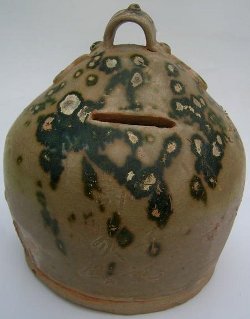
China has been using “piggy banks” for thousands of years. While these ancient coin banks were not actually in the shape of a pig and were not primarily used by children, they did serve the purpose of storing coins.
Coin banks, known as puman (扑满), were originally created as a means to enforce the laws regarding currency and market reforms. Their primary purpose was to prevent corruption and embezzlement by businessmen.
Ancient texts reveal that these coin banks existed at least as early as the time of Emperor Wu (141 BC – 87 BC) of the Han Dynasty. They were made of pottery, porcelain or bamboo. When full of coins the banks had to be smashed open to retrieve the money so very few examples have survived to this day.
The appearance of “piggy banks” during the Qin and Han dynasties is closely linked with the monetary reform which began with the creation of a united China by Qin Shi Huang. Under the Qin Dynasty (221 BC – 207 BC), the country’s currency was standardized on the banliang (半两) coin which was round with a square hole in the center and of a specific weight. A strict legal system ensured that the monetary reform laws were promulgated and enforced.
As an example, the “Laws on Markets” (guanshilu 关市律) stipulated the rules on the collection of money and required the use of the puman or “piggy bank”. In collecting money, whether for business or government purposes, the coins had to be put into these coin containers. Businessmen and peddlers had to personally watch the coins being inserted. The laws were also very clear in stating that coins could only be put in and not taken out.
If the laws were not strictly followed, the person committing the illegal activity would be fined “one suit of armor”.
These laws and the use of the piggy banks were intended to prevent corruption and graft.
Additionally, the laws and piggy banks were aimed at preventing disruption to the money supply by making it difficult for businessmen to substitute counterfeit and underweight coins for the legal tender banliang and wuzhu (五铢) coins.
There is an interesting story concerning a famous official of the Han dynasty and the piggy bank. In imperial China, government officials were selected according to their achievements in the imperial examination system which was based primarily on the Confucian classics and other ancient texts.
Gongsun Hong (公孙弘) came from a very poor family and did not even begin to study for the examinations until he was already more than 40 years of age. In 140 BC, he achieved the highest honors among all the scholars and was eventually selected to be the prime minister during the reign of Emperor Wu.
Before he assumed the office, however, an elder from his village offered him the following advice and used the “piggy bank” as an analogy.
The old man said that the piggy bank takes in money and when full it is smashed open and destroyed so that the coins can be removed. If a government official is only concerned with honors and accumulating wealth, he will eventually suffer a similar fate.
The old man said that just like the piggy bank which is simply made of clay, it is better for a person to live a frugal life. Wealth must not just be accumulated but must be distributed as well. In this way, a person can gradually become wealthier but not reach the point where he will be so full of riches that he will be destroyed.
It is clear then that the piggy bank was first used in China in the enforcement of monetary laws. It was only afterwards that these coin banks assumed the role of being a convenient means for saving money.
Today we know the piggy bank as a toy which can help children learn the value of saving money. The piggy bank displayed above served this purpose. The inscription states that it was made to celebrate the birth of a child on April 6th of the 8th year (867 AD) of the Xian Tong reign of Emperor Yizong (懿宗) of the Tang Dynasty.
One last point of interest. As already mentioned, Gongsun Hong came from a very poor family but eventually became the prime minister of the country. Following the sage advice of the village elder, Gongsun Hong became known for living a frugal life. He never forgot that prior to becoming a public official he had made his living by herding pigs for others.